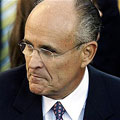A judge has ruled that there was not enough probable cause to allow recording of a conversation between an undercover police officer and a defense lawyer as part of an obstruction of justice investigation. Some attorneys across the state were concerned about the case, worried it could impinge on their ability to effectively represent their clients. The matter sprang from a domestic assault case involving defendant Terry Russ. After police had trouble locating witnesses in the case, including the victim, they initiated an obstruction of justice investigation. Russ eventually entered into a plea agreement. But because of telephone conversations between Russ and his mother, Brattleboro police apparently suspected that his lawyer, Eileen Hongisto, may have been involved in the matter as well. Police obtained a warrant allowing an undercover detective to call Hongisto and, taping the conversation, pose as a witness asking if he should testify. No charges were ever filed against Hongisto over the case. This week Judge Karen Carroll of Windham District Court ruled that warrant should never have been issued and ordered that the tapes of the conversation be returned to Hongisto. "A review of the affidavit in support of the search warrant in this matter reveals that it lacked the necessary probable cause to support the belief that Ms. Hongisto was involved in criminal activity or that evidence of a crime would be obtained through a phone call to her by an undercover police officer," according to the ruling. The judge who issued the warrant, Katherine Hayes, recused herself from ruling on Hongisto's motion that sought the tapes of the conversation. "I feel totally vindicated," Hongisto said Friday. "I hope by going as far as we did go with this that we protected defense attorneys." "I knew I hadn't said anything wrong or done anything wrong, but I needed to have the public know that as well," she said. Hongisto said she is not sure if she will file a civil lawsuit in the matter. "I haven't thought that far ahead at all," said Hongisto. Windham County State's Attorney Dan Davis said he did not see the warrant request before it was presented to the judge originally and his office will not appeal the decision reached by Judge Carroll on Tuesday. "We have followed the judge's direction and returned the audio tapes to attorney Hongisto," he said. Allegations of a crime must be investigated whether the accused is a lawyer or not, Davis said. "If, in fact, there is an allegation that someone may be involved in violating the law, that matter ought to be looked into," he said. But the investigation and tape recording of a conversation with a defense lawyer is unusual, he added. "This is a very rare event," he said. "This is the only time I am aware of in my 32 years in law enforcement in the state … that this has happened." Defender General Matthew Valerio said the judge's decision this week was the correct one. "It vindicates Eileen Hongisto and it frankly supports my opinion and the opinion of many defense counsel that there wasn't probable cause to support the warrant," Valerio said. "I never got the sense that people were going to practice law defensively" because of the case, he said. "It's not a dimmer switch. You either do it or you don't do it." As for Hongisto, she said she will continue on in her general law practice. The danger in the case for the practice of defense lawyers was that they would be blocked from advising their clients about the status of their cases, said Hongisto, who graduated from Vermont Law School and worked as a public defender before going into private practice. "You wouldn't be able to give accurate and sound legal advice to your client," she said. "If you are not allowed to discuss those options with your client, how can they make an informed and voluntary decision." |







